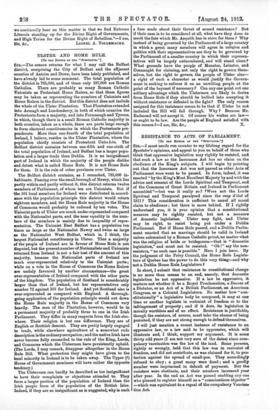ULSTER AND HOME RULE.
Pro THE EDITOR 01 TEE " SPECTILTOR."] SIB,—The census returns for what I may call the Belfast district., comprising the City of Belfast and the adjacent counties of Antrim and Down, have been lately published, and have already led to some comment. The total population of the district is 785,000, and of these only 197,000 are Roman Catholics. There are probably as many Roman Catholic Unionists as Protestant Home Rulers, so that these figures may be taken as representing the numbers of Unionists and Home Rulers in the district. But this district does not include the whole of the Ulster Plantation. That Plantation extended into Armagh and Londonderry, in both of which counties the Protestants form a majority, and into Fermanagh and Tyrone, in which, though there is a small Roman .Catholic majority in both counties, taken as a whole, there are parts large enough to form electoral constituencies in which the Protestants pre- ponderate. More than one-fourth of the total population of Ireland, I believe, resides in the Ulster Plantation, where the population chiefly consists of Protestant Unionists. The Belfast district contains between one-fifth and one-sixth of the total population of Ireland, and Belfast has a larger popu- lation and a larger trade than Dublin. It is no insignificant part of Ireland in which the majority of the people dislike and detest what is called Home Rule. It is not Home Rule for them. It is the rule of other provinces over Ulster.
The Belfast district contains, as I remarked, 785,000 in- habitants. Passing over the small borough of Newry, which lies partly within and partly without it, this district returns twelve members of Parliament, of whom ten are Unionists. But if `the 101 local members for Ireland were distributed in accord- ance with the population principle this district would return eighteen members, and the Home Rule majority in the House of Commons would probably be reduced by ten votes. The Unionist parts of Ulster are much under-represented compared with the Nationalist parts, and the near equality in the num- bers of the members is mainly due to inequality of repre- sentation. The Unionist East Belfast has a population ten times as large as the Nationalist Newry and twice as large as the Nationalist West Belfast, which is, I think, the largest Nationalist constituency in Ulster. That a majority of the people of Ireland are in favour of Home Rule is not disputed, but the present number of Nationalists and Unionists returned from Ireland is not a fair test of the amount of this majority, because the Nationalist parts of Ireland are much over-represented relatively to the Unionist parts ; while on a vote in the House of Commons the Home Rulers are unduly favoured by another circumstance—the great over-representation of Ireland compared with the other parts of the kingdom. The population of Scotland is considerably larger than that of Ireland, but her representatives only number 72 against 103 for Ireland. And yet Scotland also is over-represented as compared with England. A thorough- going application of the population principle would cut down the Home Rule majority in the House of Commons very heavily. The men of the Plantation, however, would be in a permanent majority of probably three to one in the Irish Parliament. They differ in many respects from the Irish else- where. Their religion is but one difference. They are of English or Scottish descent. They are pretty largely engaged in trade, while elsewhere agriculture of a somewhat rude description is the ordinaryoccupation ; and the native Irish have never become fully reconciled to the rule of the King, Lords, and Commons which the Ulstermen have persistently upheld. (The Lords, I may remark, disappear altogether in the Home Rule Bill. What protection they might have given to the local minority in Ireland is to be taken away. The Upper (P) House of Government nominees will have rather the opposite tendency.) The Ulstermen can hardly be described as too insignificant to have their complaints or objections attended to. They form a larger portion of the population of Ireland than the Irish people form of the population of the British Isles. Indeed, if they are so insignificant as is suggested, why is such a fuss made about their threat of armed resistance ? But if their case is to be considered at all, what have they done to merit the fate which Mr. Asquith has in store for them ? Why instead of being governed by the Parliament of a large country in which a great many members will agree in religion and politics with their representatives are they to be governed by the Parliament of a smaller country in which their represen- tatives will be largely outnumbered, and will stand alone? What grounds have the people of Munster, Leinster, and Connaught for claiming, not only the right to govern them- selves, but the right to govern the people of Ulster also— a right of such a character as would justify the Govern- ment in seeking to enforce it on an unwilling people at the point of the bayonet if necessary ? Can any one point out one solitary advantage which the Ulstermen are likely to derive from Home Rule if they should be bullied into accepting it without resistance or defeated in the fight? The only reason assigned for this insistence seems to be that if Ulster he not included the Bill will fall through. Why P Because Mr. Redmond will not accept it. Of course his wishes are law— or ought to be law. Are the people of England satisfied with


































 Previous page
Previous page